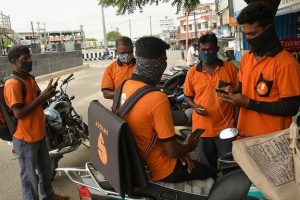Swiggy, Instakart under GST scanner

‘In full compliance’: food delivery firm
App-based food delivery service firm Swiggy has deposited ₹27.5 crore, the amount for which input tax credits under the Goods and Services Tax (GST) were allegedly availed on a fraudulent basis, according to revenue authorities probing the matter.
Swiggy and Flipkart’s delivery service arm Instakart are under the scanner for involvement in a fake GST invoice fraud, a Revenue Department official, who did not wish to be identified, said on Friday. Apart from action under the GST laws, the Income Tax department has also joined the investigation as the fake GST claims amount to concealment of income.
‘Full cooperation’
“As a law-abiding company, we are in full compliance with the tax and legal mandates,” said a spokesperson for Swiggy. “Our team extended full cooperation to the concerned authorities,” the spokesperson added.
Two senior Instakart officials have not yet responded to summons from the Directorate General of GST Intelligence (DGGI) and have moved the courts for anticipatory bail in a case involving incorrect availment as well as passing on, of input tax credits worth ₹21 crore, the official said. Their bail hearing is listed at the Patiala House District & Sessions court on January 13, the official added.
While sources at Swiggy asserted that the tax authorities had initiated a follow-up survey at the firm due to a third-party vendor’s alleged default, the revenue department contends that the modus operandi of the fraud, which has been carried out since 2017, suggests the involvement of the company’s management.
Manpower supply
“The arrested mastermind Gagan Gupta alias Gagan Kumar, has admitted to have committed the ITC scams in connivance with Instakart and Swiggy through various fake firms of manpower supplies to both business entities and where cash used to exchange hands later,” the official said. “How could the manpower supply take place between a supplier and a service user company without direct and explicit involvement of these companies’ management,” the official wondered.
In the case of Instakart, the tax department said the input tax credits were wrongfully claimed and utilised, based on fake invoices of non-existent firms named STMPL and MFPL for manpower supplies which never actually took place.
“When two officials of Instakart were shown documents pertaining to non-existence of STMPL and MFPL and bank accounts of these two non-existing companies showing debit entries form Instakart as salary, they could not explain it and started trying to locate these two vendors,” the revenue department official said.
Source: Read Full Article
